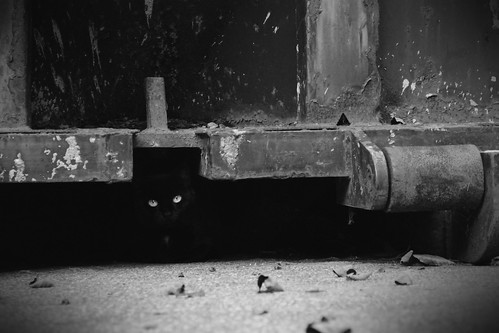Com’on, What Are You REALLY Hiding?
I remember in the 90s, when my friends wanted to roll to the “weed spot” to cop some weed, they talked of this one place they patronized that was for all intents and purposes a bodega. In the back of the bodega there was a bathroom which had a medicine cabinet with a mirror that opened. When you opened the door to the medicine cabinet you’d see a wooden wall. If you were to knock several times on the wall, someone from behind the wall would open a slit in the wall and ask you what you wanted, and you’d order your weed. He’d then get the weed, you’d pass your money through the slit and he’d in turn hand you your stash, and then you’d leave the store.
Legally this can be described as a “racket,” which is any dishonest scheme or practice, a pretending to be one thing and being another for an undisclosed benefit to the “perpetrator.” In this case, the owner of the bodega through appearances was pretending to run a bodega to fool the authorities, but in actuality he had an active, thriving pot business.
It’s the same way how a drug dealer sets up a construction company or buys several real estate properties to manage as a front to cover up his drug dealing.
Years ago, I took this human transformation, self-development forum called Landmark Forum. Despite many people having raved about how it had transformed their lives, I didn’t get too much out of it when I took it, but one of the things that they taught that helped me several years down the line to make some shifts in my life was their concept of “rackets” and how it applies to human behaviour.
Just like a criminal running a racket to hide the illegal business he’s doing, Landmark borrowed the word “racket” to describe what we do to ourselves and others.
Landmark describes a racket as a persistent complaint combined with a fixed way of being. It comes into play when we blame someone or something for things not working out in our lives. They’re maintained because of a perceived payoff the person receives such as being right while making the other person or people wrong, dominating or having power over people, to avoid feeling like a victim or being dominated, looking good, making others look bad, sympathy, etc. The payoffs are infinite and most often hidden from the perpetrator. The costs of such behaviour is love/affinity, vitality/well-being, self-expression, peace of mind, and satisfaction/fulfillment.
I remember in late 2005, I had a conversation with my mom. She mentioned how my siblings felt distant from me because I was emotionally unavailable. I told her that I was working on myself to become a better person through my pouring over thousands of self-improvement books. I told her I had been doing this for awhile, and asked her if she had noticed any change in me. She responded that she rarely saw me because so she couldn’t tell.
It was shortly after we ended the conversation that I had a blinding flash of insight. It dawned on me that my whole efforts of self improvement was really just a farce because I wasn’t engaging in self improvement to become a better person, rather I was just seeking the approval of my mother. When I was growing up, whenever she got mad at me, she’d tell me I was just like my father. I didn’t want to be like my father, I wanted to be like her, so every time she said this it annoyed me and made me self conscious and insecure. My “self-improvement” efforts were so my mom could one day tell me that I wasn’t like my father.
On the surface, through all my reading, journaling, going to seminars and being “positive,” it looked to me and everyone else was really into self improvement. Below the surface, something else was going on entirely that was hidden even from myself. What I was doing was approval seeking and NOT self improvement and as such I was being inauthentic. Furthermore, I had been harbouring resentment towards my mother for not noticing or appreciating my efforts and also because she had this power over me that I had given her. I had given her the power to validate who I was.
Also, when I wasn’t seeing any approval from my mom, I would beat myself up for not doing a good enough job of “changing.”
The payoff for my behaviour was the satisfaction I got from resenting my mom for not noticing my efforts of self improvement. The resentment gave me the feeling of justification for being “right” while judging her as being “wrong.” I also got satisfaction from judging myself for not changing quick enough. Lastly, the seeking of approval from my mom via my efforts of self improvement made me feel as if I were “atoning” for my past sins of being like my dad.
The costs of my behaviour was self esteem, because by secretly seeking my moms approval I was telling myself I wasn’t good enough the way I was and I was putting my self-validation in someone else’s hands. Your self esteem help but suffer if you do this. Also, by resenting my mom it caused an underlying separation and weakening of the mother-son bond. Lastly, it also cost me energy that I could’ve used for something more productive.
When I finally opened my eyes to what was really going on, I was able make some real changes in my life. I was aware that I did need self-improvement in my life, but now I was able to engage in the process coming from a different place. I could now focus on what I needed to change from my own point of view and my own needs, not from what I perceive was my mom’s point of view. As a result, I drastically cut the number of self-improvement books I read and my life began to take a different direction that brought me towards the changes I really needed to make.
I was listening to this podcast where a man by the name of Adam Gilbert, a Health and Fitness Coach and owner of the company, MyBodyTutor, was being interviewed. To help his clients lose weight, he incorporates in his program the psychological reasons why a person may be overweight. It happened that though many people claimed to want to lose weight and made the effort, if you popped open the hood, there were many underlying reasons why they never succeeded. Some were afraid that they were going to lose their friends because they felt that if they lost weight their friends may become jealous and also because of changed habits, they won’t be able to partake in the same activities that they once did that created the bond they had. Another dude kept the weight on because he felt that if he lost it, he was going to be more attractive to women and it would cause him to cheat on his wife.
On the surface it looked like these people were doing one thing, but hidden to everyone, including they themselves, was an entirely different agenda.
We all do this in many areas of our lives. There are people who get into relationships supposedly for love, but if you look below the surface, they feel guilty over something that happened in their childhood (parents divorcing, father not being around, one of the parents being an alcoholic, etc. etc) and really what they’re doing in the relationship is not loving their partner like they should, but instead trying to fix their partner to overcome the guilt of not doing what they felt they should’ve done as a child. There are those who make an honest effort at being financially successful, but they continue to fail because deep down inside, due to false programing from the church, feel that being wealthy is sinful.
So, I ask you as I often have to ask myself, how authentic are you? Are you doing something for the sake of doing that thing, or is there a secret, hidden reason why you’re doing it that’s so deeply ingrained that you’re not even aware of it? What hidden agenda are you carrying that’s running your life?
In The Illusion, we’re all in one way or another under the misconception that we’re doing things for their sake, totally oblivious as to how inauthentic we really are being. The Viable Alternative is to wake up and start being brutally honest with ourselves over our hidden motives for our behaviours, goals, intentions, etc. This may take some soul searching, journaling, meditation and even some therapy. The glorious end result however will be the true authentic core of who you are choosing your life rather than your wounds, insecurities, doubts, misconceptions, etc.
Doesn’t that sound like a better life?
This is The Viable Alternative.
Hope this helps,
Ike Love



